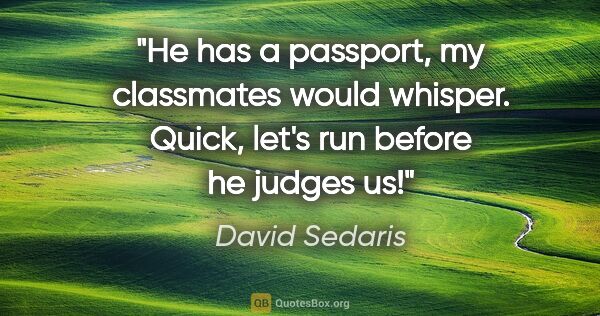Would Quotes (page 508)
He lost his Self a thousand times and for days on end he dwelt in non-being. But although the paths took him away from Self, in the end they always led back to it. Although Siddhartha fled from the Self a thousand times, dwelt in nothing, dwelt in animal and stone, the return was inevitable; the hour was inevitable when he would again find himself in sunshine or in moonlight, in shadow or in rain, and was again Self and Siddhartha, again felt the torment of the onerous life cycle.
Herman Hesse
He stepped off the pavement like a man jumping off a bridge, as calm as a swimmer with an ocean out below. Lucy had known what he was going to do the instant their eyes met. She'd know what he intended because she would have done the very same thing if she'd had his courage. Nothing was going to break his fall.
Alice Hoffman


We want to climb in with you,' Dermot said. 'We'll all sleep better.'That seemed incredibly weird and creepy to me - or maybe I only thought it should have. I was simply too tired to argue. I climbed in the bed. Claude got in on one side of me, Dermot on the other. Just when I was thinking, I would never be able to sleep, that this situation was too odd and too wrong, I felt a kind of blissful relaxation roll through my body, a kind of unfamiliar comfort. I was with family. I was with blood....
Charlaine Harris
Learn to distinguish the difference between errors of knowledge and breaches of morality. An error of knowledge is not a moral flaw, provided you are willing to correct it; only a mystic would judge human beings by the standard of an impossible, automatic omniscience. But a breach of morality is the conscious choice of an action you know to be evil, or a willful evasion of knowledge, a suspension of sight and of thought. That which you do not know, is not a moral charge against you; but that...
Ayn Rand
Sin is the only real colour-element left in modern life.'
'You really must not say things like that before Dorian, Harry.'
'Before which Dorian? The one who is pouring out tea for us, or the one in the picture?'
'Before either.'
'I should like to come to the theatre with you, Lord Henry,' said the lad.
'Then you shall come; and you will come, too, Basil, won't you?'
'I can't, really. I would sooner not. I have a lot of work to do.'
'Well, then you and I will go alone, Mr. Gray.'
'I should...
Oscar Wilde
Today, information: pulverized, nonhierarchized, dealing with everything: nothing is protected from information and at the same time nothing is open to reflection -> Encyclopedias are impossible -> I would say: the more information grows, the more knowledge retreats and therefore the more decision is partial (terroristic, dogmatic) -> “I don’t know,” “I refuse to judge”: as scandalous as an agrammatical sentence: doesn’t belong to the language of the discourse. Variations on the “I don’t...
Roland Barthes



